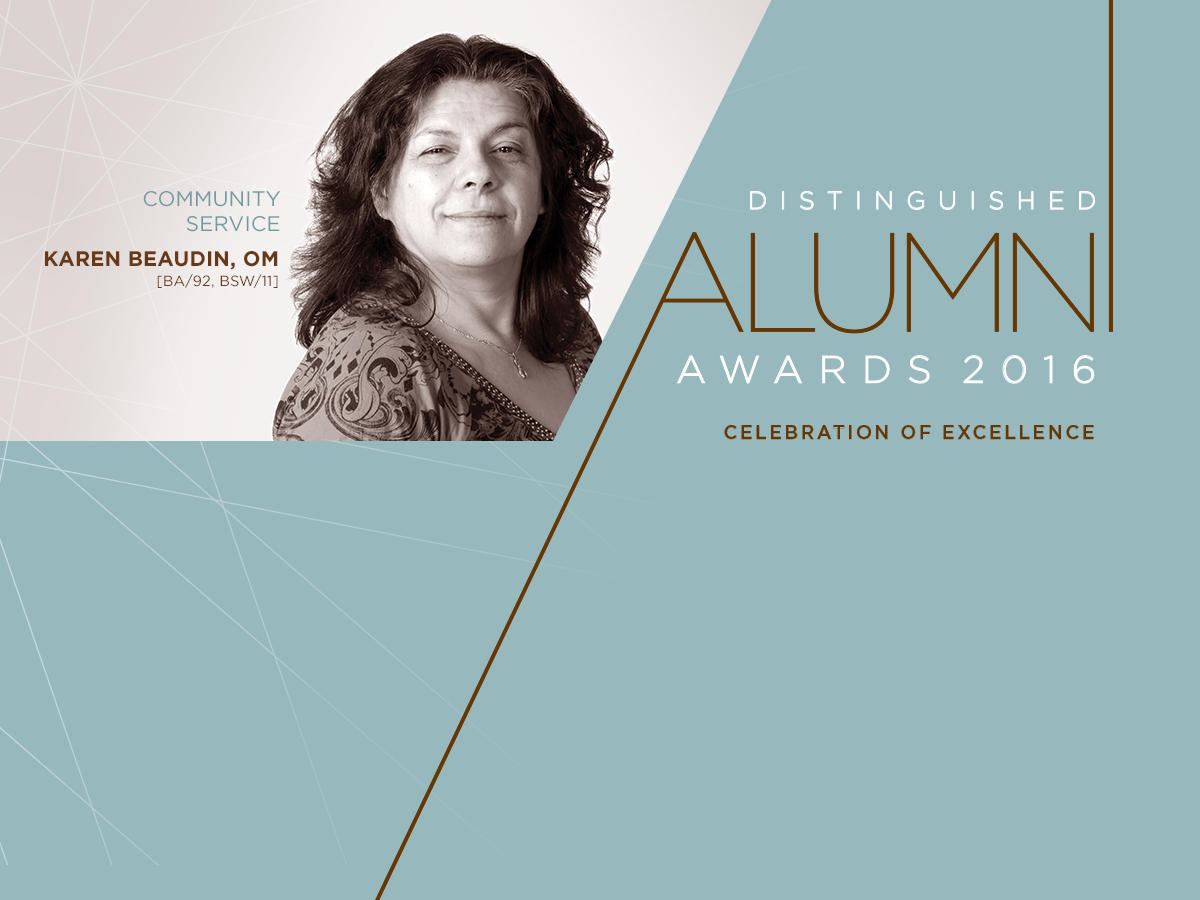
Announcing the recipient of the 2016 Distinguished Alumni Award for Community Service
Karen Beaudin—Métis leader, advocate, defender
The Distinguished Alumni Awards recognize graduates who have achieved outstanding accomplishments in their professional and personal lives. Join us May 5, 2016 at the Celebration of Excellence where we’ll honour our 2016 Distinguished Alumni Award recipients, including Karen Beaudin, OM [BA/92, BSW/11].
She strengthens community wherever she goes. As a tireless volunteer and proud Métis woman, Beaudin champions Indigenous youth, believing in their potential and shared right to opportunity. She brings her positivity to everyone she meets—whether she’s coaching soccer or teaching square dancing to Indigenous kids.
With University of Manitoba degrees in arts and social work, Beaudin supports downtown and Elmwood neighbourhoods as a community resource coordinator for the City of Winnipeg. Both personally and professionally, she steps forward to help the city’s most vulnerable. Beaudin received the Order of Manitoba in 2015.
IN HER OWN WORDS
Don’t let people tell you that you can’t do something.
I think a good role model walks the talk. A lot of people just talk the talk but they don’t follow through. I try to do the right things and I try to be honest and be a good example.
Community is people trying to work together and look after each other.
I work with the positive and try to get the negative out of my sight.
When I applied for the community development job at the City of Winnipeg I didn’t know what community development was. [The woman] who interviewed me told me I was already doing it: bringing communities together. Now I understand it but back then I didn’t. Once I got in to the position it was easy to get to know people and have people get involved.
Growing up I didn’t know who I was. I just knew I was dark-skinned, a bit darker than other people. But I think as you get older you better understand your identity. I started up the Manitoba Métis Federation local in St. Eustache. You could really see the pride of people.
People should know their history and go back to it. For example, Residential Schools—knowing helps people understand why we have the issues we have in our community: the gangs, the drugs, child welfare. I think it is important to share that history and people need to be informed. A lot of people don’t know.
I like to listen to the Elders because it is grounding. I like being part of things where an Elder is present.
I was teaching square dancing at Turtle Island and this little guy used to come all the time, then he didn’t come one Thursday. I asked where he was and was told he went into [Child and Family Services]. One day he showed up—I guess he had ran away—and I said, not even thinking, “If I can get you to come stay with me, will you stay with me?” And that’s how I got into fostering.
The university course I had the most fun in was a feminist perspectives course—such an awesome course. They kept bringing up [Manitoba politician] Muriel Smith. I knew I needed to talk to her so I called her.
One of my biggest role models was my uncle Phil. He’s a teacher. He is smart and was probably the only one from my family who worked in a field where you had to go to university to get that degree. He’s a very good storyteller—whether it was about my family, the past or older people. I’d have a cup of tea with him and ask him questions.
I don’t like controversy unless it is going to resolve something. I don’t react right away. I need time to process things. People may see it as a downfall but I don’t want to blurt something out that I’d regret.
People need to be supportive of each other, help when you can, and find out what the real issues are. Know the facts because that’s the biggest thing. You don’t know their stories. Sometimes the stories are not very nice.
If I had a magic wand I don’t know where I’d start.
Read more #UMDAA2016.
Thank you to our generous sponsor: The Personal.






